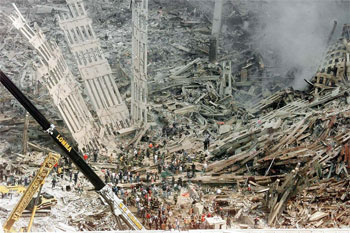The Arithmetic of Forgiveness
For Sunday September 11, 2005
Lectionary Readings (Revised Common Lectionary, Year A)
Exodus 14:19–31 or Genesis 50:15–21
Psalm 114 or Exodus 15:1–11, 20–21, or Psalm 103
Romans 14:1–12
Matthew 18:21–35
Four years ago this Labor Day weekend my son and I celebrated his start of high school by visiting New York City. We had barely returned to California and developed our pictures when on September 11 death and destruction traumatized our country like never before. The pictures we had taken of the southern tip of Manhattan from our boat ride to the Statue of Liberty, with the World Trade buildings prominent on the skyline, had an eery look and feel to them. One year later when my daughter and I visited New York, we stood at that monstrosity of a construction site called Ground Zero and I wondered: what is a Christian response to those reprehensible attacks in Pennsylvania, New York, and at the Pentagon?
The Scriptures for this week point Christians to a one-word response: forgiveness.
Peter, an impetuous disciple who in deserting and denying even knowing Jesus experienced his own deep need for forgiveness, once asked Jesus, "how many times shall I forgive my brother when he sins against me? Up to seven times?" That sounds generous in the extreme, and I am not sure I have ever even approximated that standard, but Jesus significantly expanded Peter's arithmetic of forgiveness. He told an outlandish parable about an "unmerciful servant" who received forgiveness for his own enormous debt, but then instead of extending forgiveness for a tiny debt that was owed to him he imprisoned his debtor. In the kingdom of God that Jesus announced, he instructed us to forgive not merely seven times, but seventy-seven times, or seventy times seven, which is to say beyond calculation or even comprehension. He also warns us that obtaining forgiveness is inextricably linked to offering forgiveness.
 |
Firemen at Ground Zero. |
As for receiving forgiveness, Jesus established a law of proportionality. We can expect divine forgiveness in the measure that we extend human forgiveness: "This is how my heavenly Father will treat each of you unless you forgive your brother from the heart." Similarly, in the Lord's Prayer, we pray "forgive us our debts, as we forgive our debtors." Our own sense for the need of forgiveness becomes the basis upon which we freely forgive others. We forgive because we have been forgiven, and can only long for ourselves what we lavish upon others.
Divine forgiveness might be the easiest part. We know, at least cognitively, that God is eager to forgive. He pardons fully and freely, and keeps no record of wrong. Hoping to receive forgiveness from someone we have wronged is more complicated; our spiritual and psychological health rests, to some extent, in their hands. Forgiving your own self, in my experience, can be the hardest of all. As a therapist once told me, "No matter how much your friend forgives you, it will make little difference unless you learn to forgive yourself." Somehow the voices "inside" your head need to align themselves with the assurances from God and our neighbor that they have forgiven us. Self-imposed guilt that we cannot or will not relinquish just might be the last bastion of human pride, for it is humbling to admit that we really can be that bad.
Extending forgiveness is different; here "the numbers get crazy." Jesus asks us to forgive "seventy-seven times," which is to say in a manner wildly disproportionate to the sincerity of the penitent or even the seriousness of their offense. Anyone who seeks "serial forgiveness" makes us question their motives, but Jesus says it does not matter—we still forgive them. Nor should the seriousness of the offense we have suffered compromise the genuineness of our mercy. A straightforward yet radical assurance of forgiveness, offered as Jesus says "from the heart," can heal complex, painful and egregious wrongs we have suffered or committed. Even our popular slang captures the power of pardon: "just let it go," we say. Forgiveness of this magnitude and magnanimity finds its basis not only in our own sense of need but, even more sure and certain, in the character of God Himself as a fundamentally forgiving God. So writes Paul, "be kind and compassionate to one another, forgiving each other, just as in Christ God forgave you" (Ephesians 4:32).
When we forgive others we liberate them from their sins and failures, unshackle them from the chains of anxiety, guilt and shame, point them toward a future of hope instead of mire them in a past of regret, and encourage them to hit the "reset" button to begin afresh. In short, we grant them permission to carry on. Perhaps even more important, when we forgive others we liberate our own selves from feelings of victimization, vengeance and bitterness that will corrode our souls as surely as any wrong we have committed.
 |
The Pentagon. |
Some of the bitterest betrayals and deepest hurts we can suffer occur in our own families. Such was the case in the story of Joseph for this week. Joseph's brothers were envious of their father's favoritism, so they sold him into slavery and tried to kill him. But history reversed their roles, demoting the brothers to beggars and elevating Joseph to Pharaoh's right hand in Egypt. When their fratricide was exposed, and the brothers found themselves as helpless supplicants, they fully expected that it was pay back time. But Joseph forgave them. Even more remarkably, Joseph believed that God had a larger providential purpose for the nascent nation Israel beyond the private wrongs he had suffered: "Don't be afraid. Am I in the place of God? You intended to harm me, but God intended it for good" (Genesis 50:20). The narrative concludes: "Joseph reassured them and spoke kindly to them."
Joseph's forgiveness of his brothers' fratricide elucidates the double-edged truth that God can use our worst sins and failures in mysterious, redemptive ways. This is a liberating reminder if you need forgiveness, but bitter medicine when you need to extend forgiveness. A number of Christian writers have observed this principle of radical reversal whereby God uses sin and evil for our own good. St. Augustine wrote, “God judged it better to bring good out of evil than to allow no evil to exist.” According to the contemporary Frederick Buechner, “sin itself can be a means of grace.” Julian of Norwich (1342–1414), an English mystic who lived her life in total solitude, once wrote that “sin will be no shame but an honor.” Similarly, Anthony de Mello writes that “repentance reaches fullness when you are brought to gratitude for your sins.” Finally, St. Augustine again, who wrote, “even from my sins God has drawn good.”
 |
Ground Zero. |
I can only speak for myself, and extrapolating from a personal ethic to foreign policy is both risky and complex, but as we commemorate the terrorist attacks of 9–11, I want to believe that even though a few people truly meant us great evil, God will somehow use this evil for our good. Following the Gospel story of Jesus, I want to extend forgiveness to the perpetrators of the chaos and carnage. I also want to ask forgiveness from Iraqis for entangling them in our catastrophe for at best tenuous reasons, destroying their nation, commandeering their oil (would we have deposed Saddam if there was no oil in Iraq?), killing 25,000 innocent civilians, alienating our global allies, destabilizing the Middle East, spinning our intelligence reports to justify ideology, diverting $300 billion to violence and vengeance, claiming that God is for us and against them, and for sacrificing the precious lives of soldiers from many nations. As best as I can tell, that is the wildly disproportionate arithmetic of forgiveness taught by Jesus, which I can hope to receive only in proportion to the measure that I extend it to others.
For further reflection:
* Is there someone you need to forgive? Perhaps yourself? Maybe a family member?
* Consider the consequences of not forgiving.
* Do you find it harder to extend or to receive forgiveness? Why?
* Can we, should we, move from an ethic of personal forgiveness to forgiveness in foreign policy?
* How do you relate the Gospel text of forgiveness and the story of Joseph to the 9-11 anniversary?
* What are the "sticking points" in extending and receiving forgiveness?
* A favorite book on the subject is by Lewis Smedes, Forgive and Forget; Healing the Hurts We Don't Deserve





